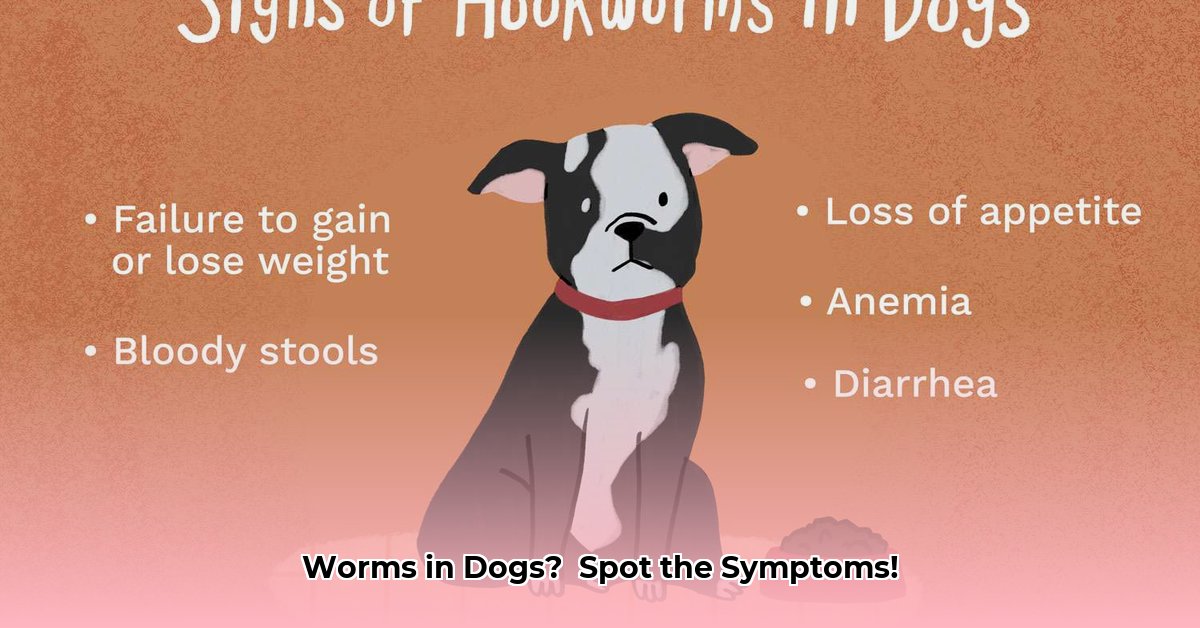
Can Worms Cause Weight Loss in Dogs?
Worried about your dog's weight? While weight loss can be a symptom of internal parasites, it's not the only, or even always the most prominent, sign of a worm infestation. Several types of worms can infect dogs, each with its own set of effects. This article will help you understand how worms impact your dog's health, including weight, and what steps to take.
Understanding the Usual Suspects: Different Worms, Different Impacts
Several types of internal parasites can infest your dog. Let's explore the common culprits:
Roundworms (Toxocara canis): These intestinal worms steal nutrients, leading to weight loss and sometimes a pot-bellied appearance. Think of them as tiny internal thieves, robbing your dog of essential nutrition.
Hookworms (Ancylostoma caninum): These blood-feeding parasites attach to the intestinal wall, causing anemia (a deficiency of red blood cells). Anemia leads to weakness and weight loss. They are essentially microscopic vampires, draining your dog's energy and resources.
Whipworms (Trichuris vulpis): These irritate the intestines, causing inflammation and hindering nutrient absorption. This, coupled with potential diarrhea, often results in weight loss. Imagine a constant irritating itch within your dog's intestines.
Tapeworms (Taenia spp.): While less likely to cause dramatic weight loss than roundworms or hookworms, tapeworms still compete with your dog for nutrients by attaching to the intestinal wall.
Heartworms (Dirofilaria immitis): These reside in the heart and lungs, disrupting blood flow and causing severe damage. Weight loss can be an indirect consequence as the dog's overall health deteriorates. This is a serious condition requiring immediate veterinary attention.
Here’s a risk assessment matrix:
| Worm Type | Resistance Potential | Zoonotic Risk (Can Infect Humans) | Severity of Weight Loss Impact | Treatment Difficulty |
|---|---|---|---|---|
| Roundworms | Moderate | High | Moderate to High | Low |
| Hookworms | High | High | High | Moderate |
| Tapeworms | Low | Low | Low to Moderate | Low |
| Whipworms | Moderate | Low | Moderate | Moderate |
| Heartworms | High | Low | Low to Moderate (indirect) | High |
Symptoms Beyond Weight Loss: A Broader Picture
Weight loss is just one potential symptom. Many other signs might indicate a worm infestation. These include:
- Digestive Issues: Persistent diarrhea, vomiting, changes in appetite (increased or decreased).
- Energy Levels: Lethargy, unusual tiredness, or disinterest in usual activities.
- Physical Appearance: Pot-bellied appearance (common with roundworms), dull coat, pale gums.
- Respiratory Problems: Coughing (a key sign of heartworms) or difficulty breathing.
If you notice any of these, even without weight loss, consult your veterinarian immediately. Don't wait; early intervention is key.
Diagnosis and Treatment: Your Vet's Role
Your veterinarian plays a crucial role in diagnosing and treating worm infestations. They'll perform a thorough physical examination and fecal examination to detect worm eggs. Blood tests might be necessary, especially to diagnose heartworms.
Treatment usually involves deworming medication, specifically chosen based on the type and severity of the infection. It's important to note that parasite resistance to certain dewormers is a growing concern, making accurate diagnosis critical for effective treatment. "The development of drug resistance in parasites is a major veterinary concern," explains Dr. Emily Carter, DVM, from the University of California, Davis, School of Veterinary Medicine. "This underscores the importance of accurate diagnosis and tailored treatment plans."
Prevention: Proactive Pet Care
Preventing worm infestations is crucial. Here are essential preventative strategies:
Regular Deworming: Your veterinarian will recommend a deworming schedule tailored to your dog's lifestyle and risk factors. This might involve preventative medication or regular fecal exams.
Flea Control: Fleas can carry tapeworms, so consistent flea prevention is vital.
Hygiene: Regularly clean up your dog's feces; this prevents the spread of worm eggs.
Safe Food Practices: Don't let your dog scavenge or eat raw meat or food of uncertain origin.
Routine Vet Checkups: Schedule regular wellness exams for early detection of any health issues.
Conclusion: Prioritizing Your Dog's Well-being
Early detection and treatment of worm infestations prevent serious health complications. Regular veterinary care, proactive preventative measures, and attentive observation are essential for ensuring a happy and healthy life for your canine companion. Remember, this article offers general information. Always consult your veterinarian for personalized advice based on your dog's specific needs.